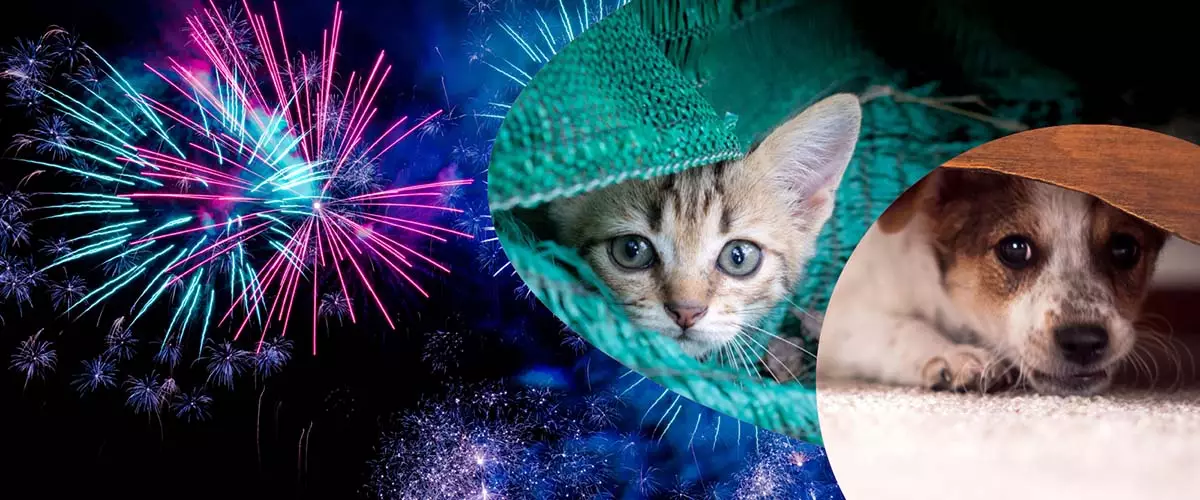Bonfire Night brings joy and celebration for many, but for pets, it can be a source of fear and anxiety. The sounds of fireworks, with their loud bangs and dazzling flashes, are startling to our four-legged companions, as their hearing and sense of sight are significantly more acute than ours. This seasonal spike in distress highlights the need for pet owners to proactively prepare their furry friends for the inevitable fireworks. According to the 2022 PDSA Animal Wellbeing (PAW) Report, a striking 41% of dogs and 30% of cats experience fear during this noisy celebration. Therefore, it’s essential to take steps beforehand to minimize their distress.
The sheer intensity of fireworks can create a torturous environment for many animals. Sounds that seem like mere pops and cracks to humans can distort into terrifying roars in an animal’s ears. PDSA vet nurse Nina Downing reported that their facilities treated over 1,200 pets with fireworks-related ailments in 2021 alone, a statistic that underscores the psychological and in some cases, physical impacts that fireworks can inflict on our beloved animals.
Recognizing that their effects can cut deeper than just a temporary scare can motivate pet owners to act long before November arrives. We must remember that these furry companions depend on us to create a safe and comfortable environment, especially during stressful times.
One of the most effective ways of preparing your pet for Bonfire Night is through systematic desensitization. This involves gradually conditioning the pet to cope with the stressors of fireworks over time. Start this process at least six weeks before the big night. Playing recordings of firework sounds at a low volume in your home can assist in this endeavor. Reward your pup or kitty with praises and treats for exhibiting calm behavior during these sound tests. Gradually increase the volume while paying close attention to signs of anxiety. If your pet begins to show distress, it’s imperative to lower the volume immediately. This method is about building positive associations while enhancing resilience.
Incorporating calming music into your routine can also be a beneficial tactic. Having familiar tunes playing can help drown out the intrusive noise of fireworks, making it an excellent part of the prep process. Ensure your pet is accustomed to this music in advance to avoid any new surprises on the night itself.
As Bonfire Night approaches, establishing a tranquil retreat becomes crucial for your pet’s emotional well-being. This personal sanctuary should be designed to offer them comfort and security when the world outside becomes overwhelming. Designate a quiet space in your home, kitted out with plenty of cozy blankets, pillows, and, if applicable, their favorite toys. For feline friends, consider high shelves—cats often prefer to be up high where they can observe from a safe perch.
Make sure this haven is ready well ahead of time, allowing your pet to explore and adapt to their new retreat. This familiarity can make a world of difference when anxiety strikes, providing them a place to retreat to amidst the chaos.
Anticipation is key. Owners should familiarize themselves with local firework display schedules and mark these dates on their calendars. Knowing when these events will occur allows you to plan your pet’s evening accordingly. Make necessary adjustments to feeding and bathroom routines to ensure pets are well taken care of before dark descends and the sky lights up.
Remember to secure your home by checking that all possible exit points, such as windows, doors, and pet flaps, are closed tightly. Scared pets can enter a state of panic, often leading them to attempt to flee from frightening noises. Thus, ensuring that your pet’s microchip information is current and that they are wearing an ID tag can be life-saving.
Finally, if your pet is known to have a heightened response to noise, discussing their behavior with a veterinarian can be invaluable. Your vet may recommend calming supplements or prescription medications to help ease your pet’s anxiety. Keeping an open line of communication with your veterinarian allows you to formulate a comprehensive plan tailored to your pet’s needs.
Bonfire Night doesn’t have to be a time of distress for pets. With careful planning and consideration, it can be navigated smoothly. By taking the time to implement these strategies, you can help your furry family members feel safe and secure while enjoying the festivities from afar. Preparing not just benefits your pets, but fosters a more harmonious home environment for everyone involved. For more detailed advice on ensuring a smoother Bonfire Night for pets, consider reaching out to the PDSA or your local vet for resources.


Leave a Reply